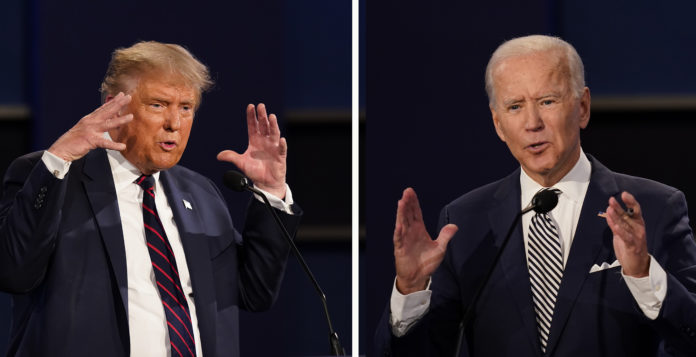
President Donald Trump and Democrat Joe Biden squared off, in a way, Thursday night, their scuttled second debate replaced by dueling televised town halls several channels apart.
The odd spectacle, which deprived most viewers of a simultaneous look at the candidates just 19 days before Election Day, seemed fitting for a race unlike any other, as yet another campaign ritual was changed by the pandemic that has killed 215,000 Americans and rewritten the norms of society.
The presidential rivals took questions in different cities on different networks: Trump on NBC from Miami, Biden on ABC from Philadelphia. Trump backed out of plans for the presidential faceoff originally scheduled for the evening after debate organizers said it would be held virtually following Trump’s COVID-19 diagnosis.
The town halls offered a different format for the two candidates to present themselves to voters after the pair held a chaotic and combative first debate late last month.
But Trump had no plans to change his tone. On Fox Business, he said of the first debate that “some people said I was rude, but you have to be rude. The guy’s a liar.”
In case anyone remained unaware of Trump’s tactics, Biden warned supporters at a virtual fundraiser that the president would go after him aggressively in the final weeks of the campaign.
“We’ve got 19 days left and you know he’s going to throw everything but the kitchen sink at me,” Biden said Thursday. “And it’s going to be an overwhelming torrent of lies and distortions.”
The president also repeatedly delivered pre-emptive attacks on NBC before the town hall, suggesting that he only agreed to the event because “what the hell, we get a free hour of television” and declaring that when the network hosted one for Biden,“they asked him questions that a child could answer.”
Trump joked that he wished he could watch Biden’s appearance Thursday night because “I wanna see if he can made it through the program.”
The two men are still scheduled to occupy the same space for a debate for a second and final time next week in Nashville. But the cancellation of Thursday’s debate still reverberated for both campaigns.
Trump and Biden battled on Sept. 29 in Cleveland in a debate defined both by the president’s constant hectoring of his opponent, which sent his support lower and by its place on the calendar: just two days before Trump announced he had tested positive for coronavirus.
Questions still remain as to when Trump last tested negative before that debate and whether he exposed Biden to the virus. The Democratic nominee has since tested negative multiple times.
Trump was hospitalized for three days, and while he later convalesced at the White House the debate commission moved to make their second debate remote — which the president immediately rejected.
What happened next set off infighting in the president’s reelection team: Instead of immediately suggesting a delay in the debates, Trump initially pulled out, only to later propose that it be rescheduled for late in October.
The Biden campaign balked, having already moved to schedule the town hall on ABC. The debate was then canceled and the Trump campaign moved to schedule its town hall — which led to a fierce backlash for NBC News’ decision to host it at the same time as Biden’s event.
NBC said it agreed to set up the dueling town hall after Trump was administered a coronavirus test Tuesday by the National Institutes of Health. Dr. Anthony Fauci and NIH clinical director Dr. Clifford Lane reviewed the test and Trump’s medical records, concluding with a “high degree of confidence” that the president was not shedding infectious virus.
Critics of NBC questioned why the network scheduled Trump for the same time, making viewers have to choose if they were interested in seeing both candidates react live in a similar format. The network considered it important that Trump be given the same format, day of the week, and length of time that Biden had on NBC last week — although he will have a different moderator. Savannah Guthrie will be Trump’s host after Lester Holt moderated the Biden event.
And, as a postscript to the mess that the second debate had become on the day, it would have been held, its would-be host, CSPAN’s Steve Scully, was suspended Thursday for lying when he claimed his Twitter account had been hacked earlier this month when he reached out to a former Trump aide for advice over the president’s attacks.
As the pace of the campaign speeds up in its final weeks, the two candidates first took care of other electoral necessities Thursday: Trump appeared at his midday rally in battleground North Carolina, and Biden raised campaign cash at his virtual event.
Trump spent much of the rally again downplaying the severity of the pandemic that, despite his efforts to change the subject, has become the defining issue of the campaign.
“It’s going to peter out. It’s going to end,” he said of the pandemic — just as he had last winter — even as cases have continued to increase nationwide in recent weeks.
The president’s appearance in North Carolina underscored the challenge confronting him in the final weeks as multiple polls have shown him trailing Biden nationally and in many swing states. Trump has spent much of the week on defense, campaigning in states he won in 2016, such as North Carolina and Iowa, where he campaigned Wednesday.
But despite the polling, Trump predicted a “big, beautiful red wave” on Election Night, before referencing another one of his major challenges: A cash disadvantage to the Biden campaign, which just announced raising a record-breaking $383 million in September.
Republished with the permission of the Associated Press.












